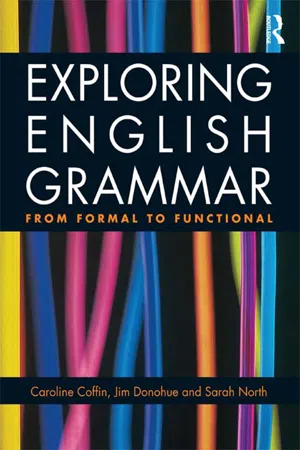
Exploring English Grammar
From formal to functional
- 464 pages
- English
- ePUB (mobile friendly)
- Available on iOS & Android
About this book
This engaging textbook bridges the gap between traditional and functional grammar. Starting with a traditional approach, students will develop a firm grasp of traditional tools for analysis and learn how SFG (Systemic Functional Grammar) can be used to enrich the traditional formal approach.
Using a problem-solving approach, readers explore how grammatical structures function in different contexts by using a wide variety of thought-provoking and motivating texts including advertisements, cartoons, phone calls and chatroom dialogue. Each chapter focuses on a real world issue or problem that can be investigated linguistically, such as "mis"-translation or problems arising from a communication disorder. By working on these problems, students will become equipped to understand and analyze formal and functional grammar in different genres and styles.
With usable and accessible activities throughout, Exploring English Grammar is ideal for upper undergraduate and postgraduate students of English language and linguistics.
Frequently asked questions
- Essential is ideal for learners and professionals who enjoy exploring a wide range of subjects. Access the Essential Library with 800,000+ trusted titles and best-sellers across business, personal growth, and the humanities. Includes unlimited reading time and Standard Read Aloud voice.
- Complete: Perfect for advanced learners and researchers needing full, unrestricted access. Unlock 1.4M+ books across hundreds of subjects, including academic and specialized titles. The Complete Plan also includes advanced features like Premium Read Aloud and Research Assistant.
Please note we cannot support devices running on iOS 13 and Android 7 or earlier. Learn more about using the app.
Information
| T: | The horse is/(pause) | |
| P: | jumping | |
| T: | yes/you say it | |
| P: | jumping | |
| T: | no/say the whole thing | |
| P: | whole thing/– horse is jumping | |
| … | ||
| T: | the big horse is jumping/you can say that one for me | |
| P: | no | |
| T: | yes/go on/ | |
| P: | can't say it/ | |
| D: | you can say it/ | |
| T: | you can | |
| P: | okay | |
| T: | goon/ | |
| P: | horse is – jumping/ | |
| T: | good boy/the horse is jumping/the big horse is jumping/ | |
| P: | big horse jumping/ | |
| … | ||
Table of contents
- Front cover
- Exploring English Grammar
- Title page
- Copyright
- Contents
- Acknowledgements
- 1 From formal to functional grammar
- 2 Talking about procedures
- 3 Describing
- 4 Talking about the past
- 5 Predicting and hypothesising
- 6 From communicative to systemic functional grammar
- 7 Shaping a text to meet social purposes: genre
- 8 Representing the world
- 9 Interacting and taking a position
- 10 Making a text flow
- Bookend: further reading
- References
- Index